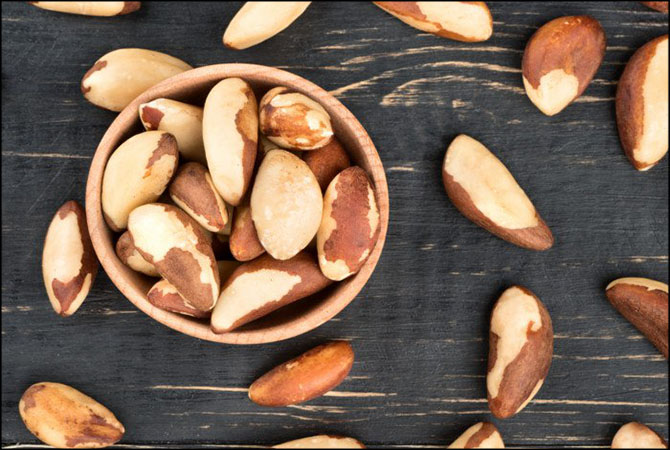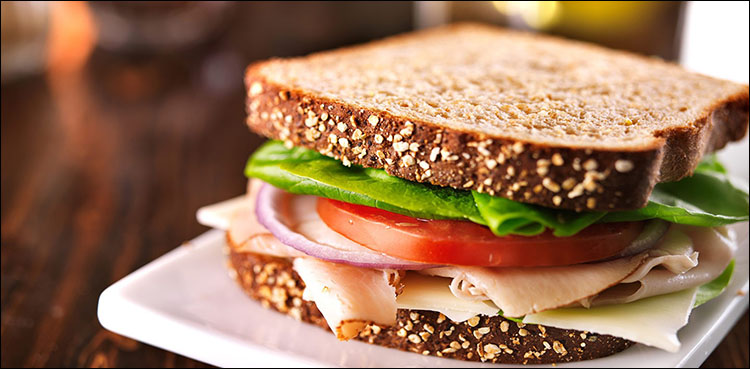People can make a variety of lifestyle changes to help manage their anxiety. Eating a diet high in vegetables, fruit, legumes, whole grains, and lean protein can be helpful.
Brazil nuts


Brazil nuts are high in selenium. Selenium may improve mood by reducing inflammation, which is often at heightened levels when someone has a mood disorder, such as anxiety. It is important not to consume too much selenium as it can cause side effects. The recommended upper limit for selenium for an adult is 400 micrograms (mcg) per day. So be careful not to take supplements with high doses or eat more than three to four Brazil nuts a day
Fatty fish


Fatty fish, such as salmon, mackerel, sardines, trout, and herring, are high in omega-3. Omega-3 is a fatty acid that has a strong relationship with cognitive function as well as mental health. Current recommendations suggest eating at least two servings of fatty fish a week. A study conducted on men found eating salmon three times a week reduced self-reported anxiety.
Eggs
Eggs are also an excellent source of protein. It is a complete protein, meaning it contains all the essential amino acids the body needs for growth and development. Eggs also contain tryptophan, which is an amino acid that helps create serotonin. Serotonin is a chemical neurotransmitter that helps to regulate mood, sleep, memory, and behavior. Serotonin is also thought to improve brain function and relieve anxiety.
Pumpkin seeds
Pumpkin seeds are an excellent source of potassium, which helps regulate electrolyte balance and manage blood pressure. Eating potassium-rich foods such, as pumpkin seeds or bananas, may help reduce symptoms of stress and anxiety. Pumpkin seeds are also a good source of the mineral zinc. Zinc is essential for brain and nerve development. The largest storage sites of zinc in the body are in the brain regions involved with emotions.
Dark chocolate
Experts have long suspected that dark chocolate might help reduce stress and anxiety. A 2014 study found that 40g of dark chocolate helped reduce perceived stress in female students. Other studies have generally found that dark chocolate or cocoa may improve mood. Chocolate has a high tryptophan content, which the body uses to turn into mood-enhancing neurotransmitters, such as serotonin in the brain.
Turmeric
The active ingredient in turmeric is called curcumin. Curcumin may help lower anxiety by reducing inflammation and oxidative stress that often increase in people experiencing mood disorders, such as anxiety and depression. A 2015 study found that curcumin reduced anxiety in obese adults. Another study found that an increase of curcumin in the diet also increased DHA and reduced anxiety.
Chamomile
Many people around the world use chamomile tea as an herbal remedy because of its anti-inflammatory, antibacterial, antioxidant, and relaxant properties. People believe that the relaxant and anti-anxiety properties come from the flavonoids present in chamomile. A recent study found that chamomile did reduce anxiety symptoms. However, it did not prevent new episodes of anxiety.
Yogurt
Yogurt contains healthful bacteria, Lactobacillus and Bifidobacteria. There is emerging evidence that these bacteria and fermented products have positive effects on brain health. A 2015 study found fermented foods reduced social anxiety in some young people, while multiple studies found consuming healthful bacteria increased happiness in some people. Including yogurt in the diet can benefit the natural gut bacteria and may reduce anxiety and stress.
Green tea
Green tea contains an amino acid called theanine, which is receiving increasing scrutiny due to its potential effects on mood disorders. Theanine has anti-anxiety and calming effects and may increase the production of serotonin and dopamine. A 2017 review found that 200 mg of theanine improved self-reported relaxation and calmness while reducing tension in human trials.


Leave a Comment